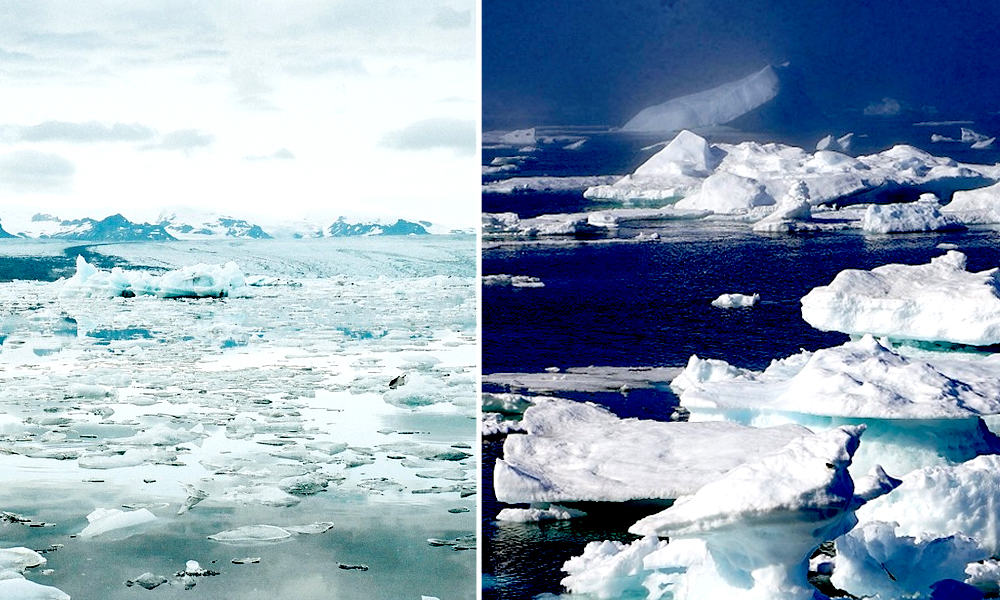The Arctic sea ice or the floating ice cover of the Arctic Ocean has shrunk to the second lowest extent in four decades due to rising temperatures, scientists said on Monday, September 22.
According to the National Snow and Ice Data Center (NSIDC) at the University of Colorado Boulder, the Arctic sea ice cover shrank to 3.74 million square kilometers by September 15, in what is only the second time the ice has been measured below 4m sq km in 40 years of record.
‘This is telling us that the Arctic Ocean is on a trajectory to have a seasonally ice-free Arctic Ocean, and this year is another nail in the coffin,’ NSIDC director Mark Serreze told CNN.
‘The 14 lowest sea ice extents have occurred in the past 14 years. It never got any better, and there is no indication of recovery. We are in a new Arctic, something we have never seen before,’ Serreze added.
In 2012, after a late-season cyclonic storm broke up the remaining ice, the ice cover had shrunk to a record low of 3.41m sq km. This year, the decline was especially fast between August 31 and September 5, due to pulses of warm air coming off a heatwave in Siberia, the NSIDC said. In the six days, the rate of ice loss was faster than during any other year on record.
In June, heatwaves in Siberia had hit 100-degree Fahrenheit. Furthermore, the massive forest fires that have ravaged parts of the Western United States also caused a rise in temperatures, Serreze said.
‘It’s fairly devastating that we’ve had such consistently low sea ice. But unfortunately, it’s not surprising,’ Twila Moon, a glaciologist at the research center in Boulder, Colorado was quoted as saying by Reuters.
According to Serreze, if the Arctic ice continues to decline, eventually, there could be no ice in the Arctic during the late summer. If that happens, there will be a devastating impact on ocean systems including phytoplankton, polar bears, and seals.
Serreze said that the ice melting is going to have ‘major’ impacts on the local marine and terrestrial ecosystems. While with less sea ice, phytoplankton blooms are increasing, however, for animals like polar bears, they are losing their home, Serreze said.
When the Arctic sea ice vanishes, it leaves patches of dark water open, which absorb solar radiation rather than reflecting it back out of the atmosphere. This process further increases farming and explains the rise in Arctic temperatures more than twice as fast compared to the rest of the world.
‘It seems like 2020 is going to down as the year when it’s the end of any plausible denial of climate change. Any individual event can be blamed on weather, but putting it all together with the heat waves, the fires, the hurricanes and tropical storms, nature is telling us something,’ Serreze said.
‘It’s us. This is all us. Our heat waves are getting hotter, the cold waves are not as cold. As Pogo said, we have met the enemy, and they are us,’ the NSIDC director added.
Tom Foreman, a polar wildlife expert and Arctic guide, said, ‘The numbers that we’re getting in terms of extent of sea ice decrease each year put us pretty much on red alert in terms of the level of worry that we have, our concern for the stability of this environment.’
The same rise in temperature is also causing the ice sheets in Arctic lands in Canada and Greenland to melt. The faster the melting of these ice sheets, the faster will be the rise in sea levels across the globe.
A study published in the journal Communications Earth and Environment last month had said that Greenland lost a record amount of ice in 2019. The study found that in 2019, Greenland’s ice sheet lost an annual record of 532 billion tons of ice, with 223 billion tons of ice lost in July alone. Meanwhile, between 2003 and 2016, Greenland lost an average of 255 billion tons of ice per year.
The researchers from Germany also found that the amount of ice lost in 2019 was 15 per cent higher than the previous worst year on record, which was 2012.
‘We have documented another record loss year for Greenland. What this shows is that the ice sheet is not only out of balance but it’s increasingly likely to produce more and more extreme loss years,’ Ingo Sasgen, a glaciologist at the Alfred Wegener Institute for Polar and Marine Research and co-author of the study, was quoted by CNN.
Similarly, another study recently published in the journal Nature compared Earth’s current situation to the 1,27,000-year old ice age and found that in the coming 15 years, Arctic sea ice could disappear into the ocean.
Researchers Dr Louise Sime and Dr Maria Vittoria Guarino stated that Earth is going through another interglacial period called Holocene and that the the sea ice completely melted in the interglacial period — a geological period between an ice age.
They, however, claimed that unlike 1,00,000 years ago when a different configuration of Earth’s orbit around the sun caused tremendous increase in temperatures, today it is caused due to human activity.
‘We know the Arctic is undergoing significant…











